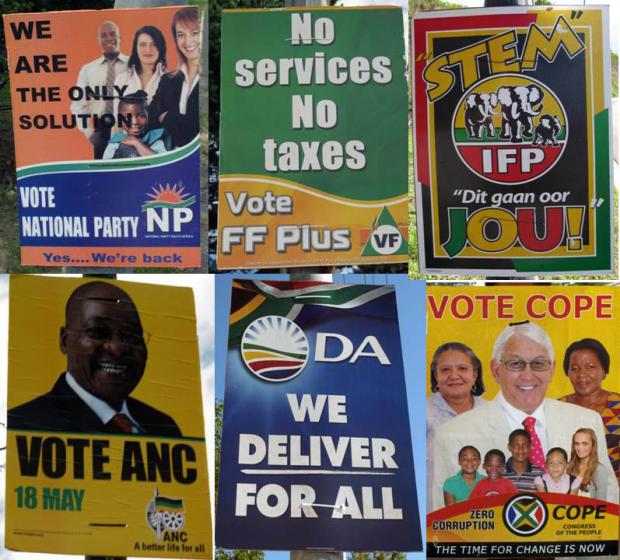Posted on May 10, 2011

Photograph credit: Jo-Anne Duggan
The photograph of the dying moments of Andries Tatane, viciously assaulted by police during a service delivery protest, will surely go down as one of the iconic images of the year. At a time when our country goes to the polls, the image of Tatane and the anguished cry of the friend who cradles him, sit uncomfortably alongside the beaming faces of our political leaders - and those who aspire to lead us - that line our streets.
Every lamppost is festooned with a poster or two urging us to vote for this party or that and flaunting promises: 'We deliver for all', 'No services. No taxes', 'Dite gaan aan JOU! [It's all about YOU!]','Zero corruption' and 'A better life for all'. These promises ring hollow in the face of the service delivery protests that have become a feature of our civic landscape, and in the face of the violence enacted upon those who hold government to account for unhonoured pledges like Andries Tatane.
Does anyone really think that these posters will sway our vote, persuade us one way or the other? Are we likely to cast our vote for the candidate with the warmest smile and the catchiest slogan? I think not. Are we likely to elect the candidate who makes the most extravagant promises? I doubt it. Will some of us vote the way we always have, guided by a sense of loyalty, an emotional attachment, however misguided this may be? Probably! Will some of us cast a vote in favour of the politicians who came down from on high and danced with us, promising the earth, or will we remember the cruel response to our protestations that local government had failed us? Possibly. How many will review the record, recall what was promised last time around, soberly weigh up the options and make a considered decision? I wonder.
Two questions then: How do we as citizens in a democratic state, decide where to place our cross on the ballot paper? And what has this to do with the archive?
The decisions we make at election time shape the world we share with others. The choices we make about who will serve us best impact not only on the present, but on the future too. Our vote may be about improving conditions in the here and now, or about rectifying the wrongs of the past, but it is also about laying the foundations of the world our children will inherit. As citizens, we have the right to vote and the obligation to use this freedom responsibly.
As we prepare to vote we need to look back into the archive, to assess whether the party we favour deserves our vote or not. Has it delivered on the promises it made in the past? We need to interrogate the record of the present. Are we comfortable with and supportive of the values it espouses and the programmes it's implementing? We need to consider the future. Does it have the vision, the will and the capacity to take us forward into a better, more just, equitable and cohesive society? We can't make informed decisions about any of these choices unless we have all the facts at hand. In the absence of records, and a culture of consulting the record, our decision is made blindly.
This is why we need to fight to ensure that the records of government are efficiently preserved and held safe, and that they are open, accessible to all and transparent. We can't exert our citizenship effectively unless we have access to information. We can't monitor service delivery if we don't have access to the records of what has been planned, what has been achieved and what is still to be done. We can't assess whether public funds have been spent wisely if we don't have access to financial records. We can't call our elected representatives to account if information about their doings is wilfully withheld from us.
Effective record keeping is not just about holding government to account. It is also critical to the way in which government conducts its day-to-day business and it underpins planning and the development of policies.
We draw information from the archive to assist us in making good decisions. We rely on the archive to provide us with the evidence that we need to support our individual options and to inform public deliberation. This is why we must ensure that the reach of the archive is broad and deep; that choices about what enters the archive are not determined by short-term agendas, political expediency or struggles over power. If we are to be free to make our choices wisely, we need to guard against valorisation as diligently as we guard against neglect.
Finally, remembering that 'the archive' is a conceptual term that refers to the historically determined body of knowledge that is available to us to draw on when we think about the past, in the present, for the future, we need to shift the meaning of the archive to take into account the range of information drawn from memory projects and other initiatives not generally considered to be 'archival'. We need to attend to the documentation of the present as conscientiously as we preserve the past.
We may not always learn from the record; indeed, looking at the photographs of Hector Pieterson and Andries Tatane, and comparing the circumstances of their deaths, it seems that we are caught up in an unending cycle of civil protest and state violence. But that does not mean that we should turn our backs on the archive. It is not the archive that has failed us, but we who have fallen short by disregarding it: relaxing our vigilance; abdicating our responsibility to act as citizens or; failing to grasp the prospect of deepening democracy.
Archives matter. We have important work to do!
Jo-Anne Duggan is the Director of the Archival Platform